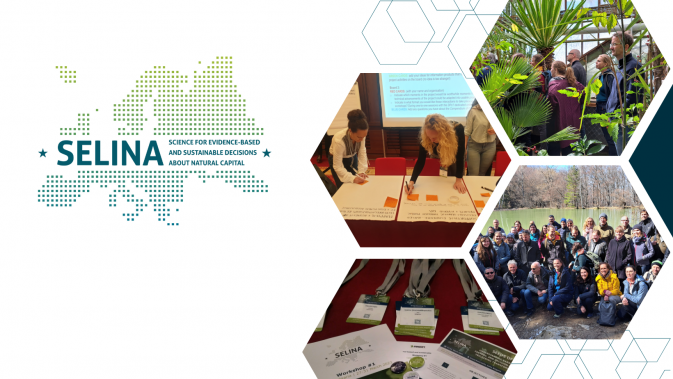Sowing seeds of change: SELINA's first thematic workshop
This press release was published by EurekAlert! and AlphaGalileo.
A three-day workshop in Sofia brought together experts and stakeholders to discuss seeds of transformative change in the context of biodiversity and ecosystem services.
From 27 to 31 March 2023, nearly 120 experts and key stakeholders from public and private sectors gathered together for a workshop in Sofia, Bulgaria, to deliberate the enabling factors and barriers to implementing biodiversity and ecosystem services into decision making processes. The attendees of the meeting were representing various business, government, civil society, and science sectors and were coming from all 27 EU member states, Israel, Norway, Switzerland and North Macedonia.
The workshop was organised within the framework of the SELINA collaborative project, which is funded under the EU Horizon programme and contributes to reshaping decision-making processes within the public and private sectors by improving the uptake of biodiversity, ecosystem conditions, and ecosystem services information. It was the first one in a series of interactive workshops planned within the project to support the constant flow of information, joint creation and mutual exchange of knowledge.
What are the barriers and enabling factors when it comes to implementing biodiversity and ecosystem services indicators in decision making?
SELINA workshop participants pointed as the most common barriers resistance to change and scepticism, as well as lack of capacity, collaboration, regulations, knowledge, accurate data, common language, and political will.
Workshop attendees also identified a number of enabling factors that could in turn help to implement biodiversity and ecosystem services and related indicators in decision-making processes. They mentioned communication, stakeholder engagement, data availability, EU regulations, synergies and collaboration as possible drivers for successful implementation. Participants recognised SELINA as an initiative that can help to facilitate the mainstreaming of biodiversity and ecosystem services in Europe especially through providing guidance and promoting good examples and practices.
The SELINA project will in fact provide guidance through its key output – the Compendium of Guidance (CoG) that is planned to serve public and private decision makers. The CoG will be developed through a co-creation process with experts and stakeholders that started already in Sofia, where workshop participants provided the first round of input into the structure and the potential content of the document. They were consulted about the needs, interests and desires they have for the CoG and also deliberated how the CoG could translate the technical advancements of the project into user-friendly guidance products to support decision-making needs and in what forms.
Exploring local ecosystems and an urban heat island effect demonstration
To get hands-on experience with one of the altogether 15 SELINA's demonstration projects and to have the chance to explore local ecosystems, participants took a field trip around Sofia. They got engaged in an urban field demonstration by Macroplan, Bulgaria, who performed a drone-based mapping exercise of the spatial distribution of land surface temperatures and made an assessment of the urban heat island effect. The urban heat island was presented as one of the most significant examples of the impact of cities on the environment and human health.
Participants then visited the Botanical Garden of the Bulgarian Academy of Sciences that maintains the richest collection of plants in Bulgaria including over 4 500 types and forms of plants, which represent over 1% of the variety of higher plants in the world. The public function of the Garden is related to the issues of exploration and conservation of biodiversity and the dissemination of knowledge about it among the broadest public strata, with a view to building a relationship to the sustainable management of biodiversity. The field trip finished with a visit to a local nature site where participants had the opportunity to explore local ecosystems and got to know the biodiversity of Vitosha, one of the first nature parks in Bulgaria and on the Balkan Peninsula.
“The first SELINA workshop is an important milestone for the project. Within these three days, we have successfully sowed the seeds of change. Now we want to make them grow through continued collaboration and collective action towards ensuring evidence-based decision-making that supports the protection, restoration, and sustainable use of our environment,” shared the coordinator of SELINA, Prof. Dr. Benjamin Burkhard from Leibniz University Hannover, Germany.
For more insights from the workshop and other SELINA activities, check out the SELINA website and follow SELINA on social media.
The next SELINA workshop will be held in Madrid in October 2023.
Read the press release in EurekAlert! and AlphaGalileo.
